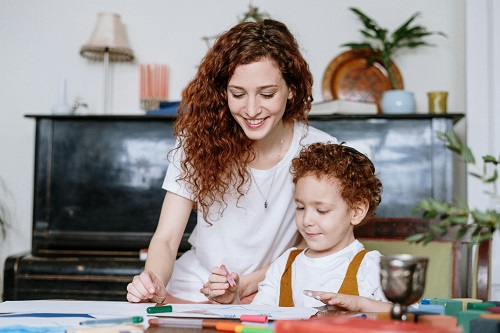The Ultimate Guide to Getting Organized With Your Family
By Pamela Wong
Pamela is a Trained Professional Organizer based in Oakville, Ontario and is the owner of Zen N Organized. She helps homeowners and small business owners transform their homes and home offices into organized spaces. She has a practical, non-judgemental approach to organizing. Her objective is to create functional and harmonious spaces for her clients.

Being a busy mom myself, I can relate to the stress of juggling work, family and health. It is often difficult to find the time and energy to check off your to-do list.
Aside from obligations at work, you are also managing household chores, family activities and school schedules. You understand that staying organized is essential for creating a harmonious home. The questions are: “how”, “when”, “where” and “what”.
This guide will help you determine the most common issues, the way to go about it and how to make organizing a collaborative and rewarding experience that can involve the entire family.
When is the Best Time to Get Organized?
1. Recognize the Signs
Understanding when to start organizing often begins with recognizing the signs that your current system isn’t working.
- Constant Clutter
If you find yourself constantly cleaning up messes or losing important items, it is time to consider getting organized.
- Stress and Anxiety
Feeling stressed or overwhelmed by daily tasks is a clear indicator that organization could help.
- Missed Appointments and Deadlines
Regularly missing appointments or forgetting deadlines suggests a need for a more structured approach.
2. Seasonal Transitions
Seasonal changes are natural times to reorganize your home.
- Spring Cleaning
Spring is synonymous with new beginnings. Use this time to declutter and refresh your home.
- Back-to-School
As your kids head back to school, it’s a perfect time to reorganize their study spaces and routines.
- New Year
The start of a new year is an ideal opportunity to set organizational goals and create new habits.
3. Major Life Events
Significant life changes often necessitate a fresh organizational approach.
- Moving
Moving to a new home is an excellent time to purge unnecessary items and start fresh.
- New Job or Schedule
A change in work schedule or job can impact your daily routines, making it a good time to reevaluate your organization strategies.
- Welcoming a New Family Member
Whether it’s a new baby or an elderly relative moving in, a growing family can benefit from updated organizational systems.
Where and How to Start?
1. Identify Problem Areas
Start by identifying the areas of your home that cause the most stress or chaos. The most common areas are:
- Entryway
This is often the first area to get cluttered with shoes, bags, and coats. Setting up an organized entryway can make a big difference.
- Kitchen
This is, perhaps, the busiest space in a home. Getting the kitchen well-organized can streamline meal prep and reduce stress.
- Kids’ Rooms
Keeping children’s rooms tidy can be challenging, but it’s crucial for their development and your sanity.
- Home Office
If you are self-employed or if you work from home for part of the workweek, then having an organized office is essential for productivity.
2. Set Realistic Goals By Creating A Plan That Works For You
Develop a detailed plan and ensure that each step includes achievable goals to guide your efforts.
- Break it Down
Instead of trying to organize the entire house at once, tackle one room or one area at a time.
- Set Deadlines
Set deadlines according to your timeline. Your timeline may vary depending on your schedule. You may only have 20 minutes one week, whereas you may be able to squeeze out an entire hour on another week. Give yourself a deadline for each task and stay on track.
- List Priorities
Make a list of areas to organize in order of priority.
- Celebrate Small Wins
Acknowledge and celebrate each area you successfully organize to stay motivated.
*You may also be interested in these:
https://zennorganized.com/decluttering-where-to-start/
https://zennorganized.com/decluttering-tips-the-dos-and-donts/
How to Get Your Family Involved
It is important to have other family members involved.
1. Communicate the Benefits:
Explain to your family why getting organized is important.
- Reduced Stress
A tidy home reduces stress and creates a more peaceful environment.
- More Free Time
Being organized means less time spent searching for things and cleaning up, allowing more time for fun activities.
- Teaches Responsibility
Involving kids in organizing teaches them valuable life skills and responsibility.
2. Assign Age-Appropriate Tasks
Give each family member tasks suited to their age and abilities.
- Young Children
Simple tasks like putting away toys, sorting laundry, or setting the table.
- Older Children
More complex tasks like organizing their own rooms, helping with meal planning, or cleaning common areas.
- Spouse
Collaborate on organizing shared spaces like the kitchen, garage, or living room.
3. Make it Fun
Turn organizing into a fun family activity.
- Play a Game
Create games or challenges, such as who can tidy up their space the fastest or who can find the most items to donate.
- Use Music
Play upbeat music to make the task more enjoyable.
- Offer Rewards
Set up a reward system for completed tasks, like a family outing or a special treat.
4. Establish Routines
Create routines to maintain organization.
- Daily Habits
Encourage everyone to spend a few minutes each day tidying up their areas.
- Weekly Check-ins
Have a weekly family meeting to discuss what’s working and what needs adjustment.
- Seasonal Overhauls
Schedule seasonal organizing sessions to keep the whole house in order.
5. Lead by Example
Model organized behavior to inspire your family.
- Be Consistent
Show your family that you value organization by maintaining your own spaces.
- Involve Everyone
Ensure that organizing is a family effort, not just one person’s responsibility.
- Show Patience
Understand that developing new habits takes time and patience, especially for kids.
By choosing to transform your home from chaos to calm, and to engage your family in the process not only make the journey more manageable, but it also lightens the load and teaches your children valuable life skills and fosters a sense of teamwork.
Embrace the journey to a more organized home and enjoy the benefits of reduced stress, increased productivity, and more quality time with your loved ones. Start today, and watch your home and family thrive in an organized environment.

